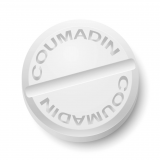
Buy Coumadin Generic Online at Cheap Price - Chose the Necessary Warfarin Dosage Below
Coumadin Generic is a different name for the same Warfarin ingredients. The content of Coumadin Generic pills is absolutely the same as in the branded Warfarin analogue.
Rate Your Experience & Write a Review About This Medicine
Coumadin Generic (Warfarin) is a medicine that is used to treat blood clots, such as pulmonary embolus or deep vein thrombosis. This drug also helps to prevent harmful blood clots, this, in turn, helps to reduce the risk of a heart attack or stroke in people with valvular heart disease, atrial fibrillation, and artificial heart valves. Warfarin is an anticoagulant or blood thinner as it is commonly referred to.
Warfarin is sold under the brand name of Coumadin Generic.
It is essential to inform your doctor about your current health status, allergies to certain medications as well as products you currently use. Be sure to inform your doctor if you have or you have had congestive heart failure, overactive thyroid, celiac sprue, rheumatoid arthritis, Sjogren syndrome, diabetes, Marfan syndrome, lupus, scleroderma. Also, inform your physician if you have had low blood platelets after receiving heparin.
It is essential you inform why dentist, surgeon, or doctor who treats you that you are taking this medication. Keep this drug out of the reach of children. More importantly, do not share your medicine with others, especially those who have a history of drug abuse.
It is essential you follow the instruction on the prescription label. Take it exactly as prescribed. Do not attempt to reduce or increase your dose without consulting with your doctor. More importantly, do not self-medicate.
Do not take alcohol while using Warfarin as it may affect the metabolism of the drug and can elevate the INR which will, in turn, increase the risk of bleeding.
Warfarin may be taken with or without food.
Use this medication regularly to get optimal benefit. Do not diet while taking Coumadin Generic. Also, inform your doctor if you notice anybody weight changes.
Seek emergency help if you overdose on this drug. Do not take twice the prescription to make up for a missed dose. If you miss a dose, take it as soon as you remember however if it is almost time for your next one, you are advised to skip the missed dose.
Warfarin is available in the following strengths: 1mg, 2mg, 2.5mg, 3 mg, 4mg, 5mg, 6mg, 7.5mg, 10mg.
Patients with thromboembolic stroke prophylaxis, deep vein thrombosis, myocardial infarction, pulmonary embolism and prosthetic heart valves should take an initial dose of 2mg to 5mg orally once a day. Afterward, the dose should be between 2mg to 5mg daily.
It is important to note that dosage and administration should be based on the medical condition being treated, patient's INR, and response to treatment.
Side effects :
Some common side effects associated with the use of Coumadin Warfarin include:
If you have any of adverse effects listed below, discontinue the medication and inform your doctor immediately:
Coumadin Warfarin is known to interact with 880 medications. These include:
The above is not a complete list of products that interact with Warfarin; it is important to consult your physician for a comprehensive list of medicines that may interact with Coumadin Generic.